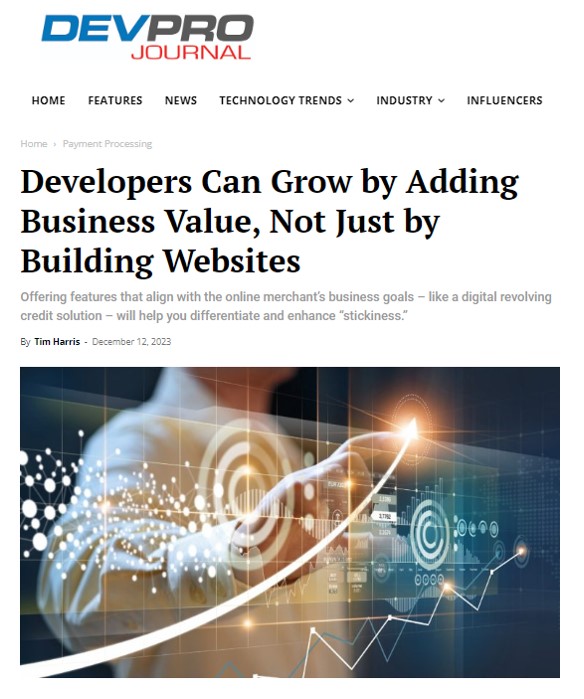Developers Can Grow by Adding Business Value, Not Just by Building Websites
As seen in DevPro Journal, December 12, 2023

Here’s the latest article by FuturePay CEO Tim Harris, addressing e-commerce developers, system integrators, and ISVs (independent software vendors) who make it their business to create merchant web sites. These developers need to differentiate themselves by offering services and features that align with merchants’ goals to build customer lifetime value. Take a look at Harris’ advice:
There is no denying it’s a competitive world out there for developers and system integrators. Many providers have the programming, development, and graphics skills to build and operate a functional e-commerce site. And globalization has only broadened the field of competitors. Throw in quicker coding with the help of AI (artificial intelligence) tools like ChatGPT, and it becomes that much more of a challenge for even the most experienced developer to differentiate themselves.
In today’s market, developers and other vendors must do more than just construct websites. They need to deliver value that will help e-commerce merchants improve business outcomes. Savvy developers should be able to offer strategies, features, and tools that help merchants retain customers, lower their acquisition costs, increase customer lifetime value (LTV), facilitate better experiences, and foster repeat business to differentiate their services.
Strategic e-commerce guidance is necessary because the merchant community faces fierce competitive pressure as well. Customer acquisition costs are higher than ever before: currently estimated at $29 – up from $9 in 2014. That’s a staggering 222% increase. Many e-commerce merchants simply can’t survive on new customer acquisition alone—the numbers just don’t add up. They need to capture and nurture repeat business.
Helping Merchants Increase Customer Lifetime Value
Websites exist to convert visitors into buyers and generate sales. Yet even some of the most successful retailers are not sure what features and tools best convert clicks to transactions. Although there are many resources that excel at driving traffic, merchants really need solutions that convert interest into sales.
A savvy system integrator can provide e-commerce capabilities that nurture long-term customer relationships and maximize conversions. This includes tools that increase customer lifetime value (LTV), or the volume of purchases the customer makes over the lifetime of that merchant relationship—offsetting those skyrocketing customer acquisition costs. By increasing a merchant’s LTV, the provider elevates his or her profile above the competition and demonstrates a unique ability to help the merchant expand revenue and build customer loyalty. It positions the SI or developer as an indispensable resource.
Encouraging Repeat Purchases and Loyalty Through Digital Revolving Credit
Offering tools that build value could be as simple as embedding a digital revolving credit financing solution into a merchant’s shopping cart through a simple API. Digital revolving credit has significant advantages over typical Buy Now Pay Later (BNPL) products when it comes to aligning with the merchant’s objectives. Digital Revolving Credit offers consumers a reusable line of credit which encourages repeat purchases. This contrasts with BNPL installment loans, where customers finance a single transaction and must reapply every time they make a purchase.
Another hard truth: Nearly 70 percent of shoppers abandon their carts. Reports show that high costs and a lack of satisfactory payment options are some of the main reasons why this happens. Digital revolving credit accounts typically allow for more flexible repayment options compared to BNPL’s structured installment plans. This better accommodates the shopper’s budget, supporting greater conversion rates while fostering customer loyalty.
A payment method that can improve average customer lifetime value can also help offset the rising customer acquisition costs. By positioning themselves as business consultants with expertise to improve business outcomes, developers and systems integrators can add revenue-generating supplemental technologies—like digital revolving credit—to differentiate their offerings and strengthen relationships with merchants. Instead of competing in the commoditized world of website development, these organizations can position themselves as trusted, long-term advisors in a fast-growing industry.